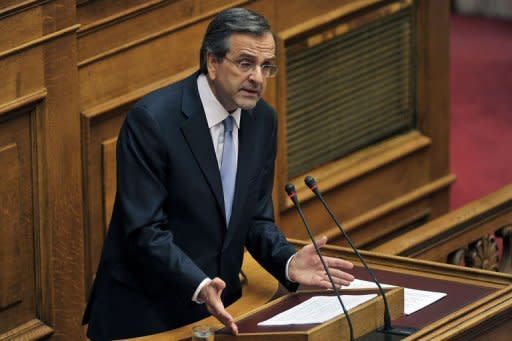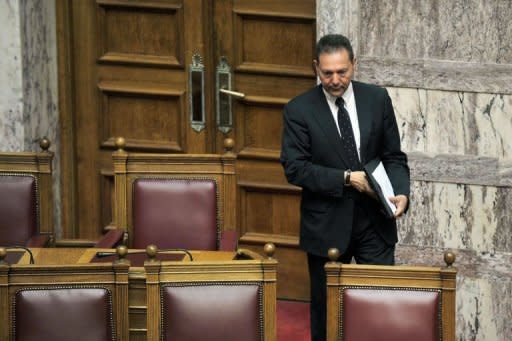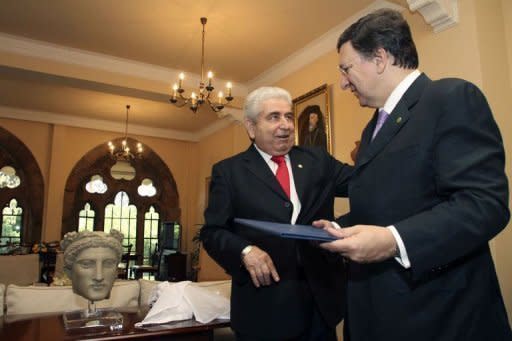Greece seeks more time to meet bailout terms
Greek Prime Minister Antonis Samaras on Friday asked EU-IMF creditors for more time for a tough bailout programme, to ease the pain on an economy struggling in its fifth year of recession. "We ask for the adjustment to be reached not in two years but later," he told parliament as he presented targets for the next four years, promising to push through a privatisation drive and keep Greece in the eurozone. In exchange for extending a 2014 deadline to meet strict deficit benchmarks, Samaras promised that his newly elected government would meet all other commitments which lenders have demanded. "Our problem is not adopting reforms, which we will do without question. It is not reaching an objective, which we will meet. But it is finding an end to the recession," he said. Samaras spoke as auditors from the European Union and International Monetary Fund pick through government books to determine how well Greece has met pledges made in return for its latest 130-billion-euro bailout. Greece must win the confidence of the auditors to obtain the next slice of aid money which it needs to pay current expenditure. Samaras stressed that the "the goal of the government is to guarantee the place of Greece in the eurozone against those who want to undermine it." He also promised the "closure or merger of several state entities" this year and faster privatisation, including of the national railway company. He also repeated a warning made Thursday by Finance Minister Yannis Stournaras that Greece's recovery programme was "off-track" after two election campaigns in two months. To address the problem, Samaras asked creditors for their understanding that it is in order "to reach the programme's objectives that we must change aspects of it that are making our recession worse". "We will do everything to change what needs to be changed, fight against recession so that the country meets its targets... while reinforcing our country in the heart of the euro and the European Union," Samaras stressed. Greek ministers have been instructed to cooperate with the EU-IMF inspectors, who began their audit earlier this week, and refrain from asking for outright renegotiation requests. The labour ministry told the auditors on Thursday that unit labour costs were down by eight percent and on track towards a 2014 target of 15 percent, the state-run Athens News Agency said. EU finance ministers meet Monday to follow up on a summit last week that was presented as a breakthrough in getting through the debt crisis but a European Central Bank interest rate change Thursday disappointed markets. Cyprus meanwhile, which now holds the EU's rotating presidency, complained its banks had paid a "heavy price" to enable Greece to write off more than 100 billion euros ($124 billion) in private sector debt as part of its second debt rescue, forcing a bailout request to shore up Cypriot lenders. "This was not a fair way to deal with it," Cypriot Finance Minister Vassos Shiarly said. "It was a European problem," he said, as Russia said it had received a bailout request from Cyprus for 5.0 billion euros. Greece said it will on Tuesday seek to raise 1.25 billion euros in six-month treasury bills, and until the EU and IMF release more funds, the Greek government needs all the money it can find. Tax authorities this week said they had only managed to conclude about five percent of tax arrears cases, bringing in just 631 million euros. Samaras, 61, took office after June 17 elections, promising an austerity-weary nation that he would re-examine salary cuts, tax rises and job losses. In a letter to EU leaders last week, Samaras -- housebound at the time after major eye surgery -- said Greece must obtain "necessary modifications" to its rescue programme in order to fight off recession and reach its economic goals. But on Monday ECB executive board member Joerg Asmussen warned Athens that revisiting its programme was "risky" and "also not for free". Greece was rescued in May 2010 and late last year agreed another accord which included a big write-off of debt owed to private investors. The EU-IMF audit is expected to last weeks and actual negotiations with creditors are set to begin only at the end of the month.




